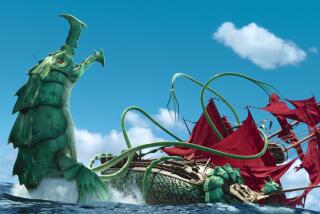Disputed Island Calls Old Man of the Sea
- Share via
MACHIAS SEAL ISLAND — It’s less than two dozen acres of scrub-covered rock surrounded by miles of ocean. But this pint-size island is a full-size obsession for a sea captain from Maine.
Barna B. Norton and his son believe the Canadian government, which operates a lighthouse here, is trespassing on their birthright.
“Canada is stealing the island,” said Norton, a defiant Down Easter who guides tours to Machias Seal Island and, once each year, parades around the rocky outcrop with a large American flag.
At 83, Norton looks the part of the crusty New Englander, from his straw hat and wool sweater to his leather shoes with the toes cut away to ease the pain of arthritis. But he isn’t about to let age get in the way of his lifelong quest to take control of Machias Seal Island.
Both the United States and Canada claim it, pointing to 17th- and 18th-century documents to back their cases. The long-simmering dispute between neighbors is an amicable one, except for Norton’s antagonism.
Norton and his 50-year-old son, John, believe the island was willed to them by Barna’s great-grandfather, Barna “Tall Barney” Beal, a 7-foot, 280-pound brawler described as a “walking hurricane” who claimed the island for himself back in 1865.
But Canadian officials say their nation’s claim has roots in a British land grant issued in 1621, long before Tall Barney ever swaggered here. Canadian and British lighthouse keepers have resided on the lonely outpost since 1832.
“We believe it’s solid,” said Sean Rowan, spokesman for Canada’s Department of Foreign Affairs. “It’s based on treaties as well as possession.”
The U.S. claim derives from the 1783 peace treaty with Britain that ended the American Revolution.
Norton’s efforts are backed by a 1983 letter from the U.S. State Department that declares: “Machias Seal Island is part of the United States and has been since the founding of the Republic.”
The letter adds, “You have every right to ignore any regulations that Canada might pretend to set for Machias Seal Island.”
The State Department said it wants to resolve the issue, but Canada has refused to discuss it.
As the diplomatic standoff continues, Norton and his son ferry bird-watchers to the disputed island to see its thousands of puffins, arctic terns, common terns and razorbill auks. Only the low moan of a foghorn competes with the crash of waves, rush of wind and calls of birds, thick in the blue summer sky.
Barna keeps an American flag clipped to an umbrella he uses to ward off marauding terns as he leads his visitors, who pay $50 apiece, past a sign identifying the land as a Canadian Coast Guard facility and wildlife preserve. Typically, some tourists get pecked on the head by the birds.
From small, shedlike blinds, the bird-watchers get a close-up view of flocks of birds cavorting on rocks just a few feet away.
“You see them playing with each other, tugging on each other’s tails,” said Rudy Bosch, a schoolteacher from Hailey, Idaho, as he ate lunch in the shadow of the lighthouse.
Most tourists are drawn by the puffins, black and white penguin-like birds with bright orange beaks and feet, strong swimmers but graceless on land.
“They’re such round butterballs,” said Simon Thompson of Tryon, N.C.
While the Nortons accuse Canada of stealing their bird-covered island, they don’t have any problems with the Canadian ranger and lighthouse keeper who live there. Actually, they’re friends. In fact, the Nortons say Canadian officials do a fairly good job running the island.
One change the elder Norton would make if he got control: limiting access by academics who “study the birds to death.”
There was a time, after Barna served in the Coast Guard during World War II, when he used the island as a relay point for refrigerators and other appliances en route from Maine to be sold in Canada. Transferring them to Canadian boats at Machias Seal Island allowed the sailors to dodge customs fees. Barna figures he broke no Canadian laws, since the transactions took place on U.S. soil.
Today, the Nortons’ interest in the island has more to do with national and family honor.
After returning to their home base at Jonesport, Maine, on a lazy summer day, John Norton reflected on the dream of winning ownership of the island as he relaxed in the sun on their 30-foot boat, The Chief.
“The island belongs to me, but everyone is welcome,” said the younger Norton, who stands ready to carry his father’s torch and who plans to will the island to his daughter, now 5.
As for Barna, he makes it clear his claim remains strong. At the port, the old captain argued about Machias Seal Island with a Canadian woman.
“Possession is nine-tenths of the law,” she observed.
Barna shot back, “But if you steal an automobile and a policeman stops you, you can’t say possession is nine-tenths of the law.”
Then he went on fueling his boat for the next day’s 40-mile round-trip voyage.
More to Read
Sign up for Essential California
The most important California stories and recommendations in your inbox every morning.
You may occasionally receive promotional content from the Los Angeles Times.












